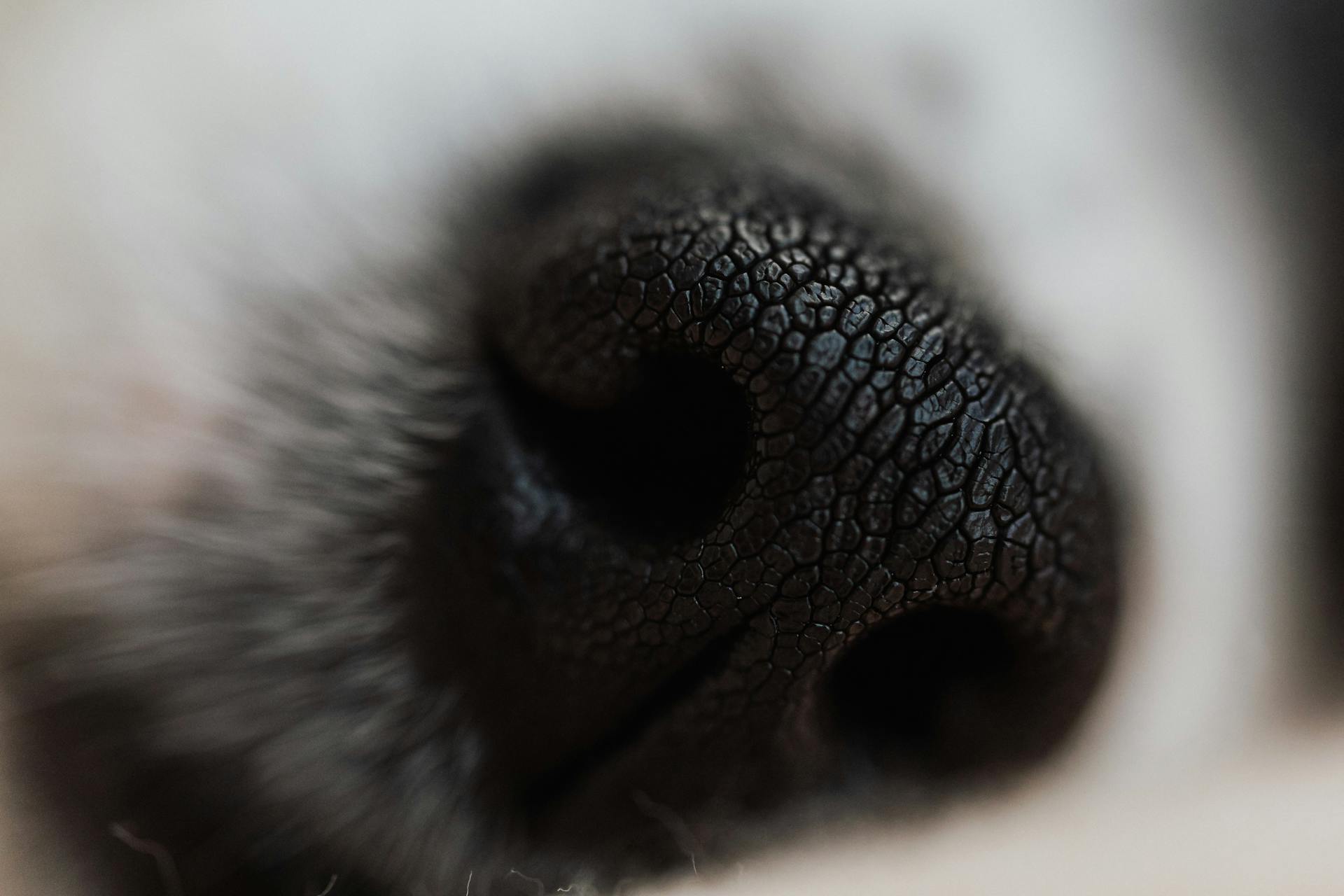
Distemper is a highly contagious and potentially deadly disease that affects a dog's respiratory, gastrointestinal, and nervous systems. It's caused by a virus that's spread through contact with an infected dog's saliva, mucus, or urine.
Symptoms of distemper can vary, but common signs include fever, vomiting, diarrhea, and a distinctive cough. In severe cases, distemper can cause seizures, paralysis, and even death.
Dogs that are not vaccinated or are malnourished are more susceptible to contracting distemper. In fact, according to the article, distemper is most commonly seen in dogs that are not up-to-date on their vaccinations.
Additional reading: Kennel Cough in Elderly Dogs
Causes and Transmission
Causes of distemper and kennel cough in dogs are often confused with each other, but they have distinct differences.
Distemper and kennel cough are caused by different pathogens, with distemper being caused by a virus and kennel cough being caused by a combination of viruses and bacteria.
Distemper is shed in all body secretions of acutely infected animals, making it highly contagious.
For another approach, see: Ferret Distemper
Kennel cough can be transmitted through direct contact with infected dogs, contaminated people or objects, and the air.
In fact, kennel cough is considered an "air-borne" contagion, with dogs capable of aerosolizing droplets up to 20 feet.
Bacteria such as Bordetella, Streptococcus equi subspecies zooepidemicus, and Mycoplasma can also contribute to kennel cough.
Here's a breakdown of the common causes of kennel cough:
- Canine distemper virus
- Canine adenovirus type 2
- Canine influenza
- Canine pneumovirus
- Canine respiratory coronavirus
- Canine herpesvirus
- Pantropic canine coronavirus
- Canine reovirus
- Mycoplasma
- Streptococcus equi subspecies zooepidemicus
- Bordetella
It's worth noting that even a simple exposure, such as a quick meeting at a dog park, can be enough to transmit the infection.
Virus can be transmitted by fomites such as hands, feet, or instruments, even if it's short-lived in the environment.
Careful isolation of all dogs with upper respiratory signs and/or diarrhea, poor appetite, and weight loss is especially important in a shelter where distemper is a concern.
Symptoms and Diagnosis
Symptoms of kennel cough typically start within two to three days of exposure, but can take up to 10 days. The most common symptoms include a cough, especially when pressure is applied to the trachea or windpipe, sneezing, and eye discharge.
Discover more: What to Do When Your Dog Has Kennel Cough
The cough can sound like the dog is retching or dry and hacking, and in more severe cases, the dog may have a fever, trouble breathing, and a lack of interest in eating. Unvaccinated dogs, puppies, and dogs with weak immune systems are more likely to experience severe symptoms.
Diagnosing kennel cough is a process of elimination, as the symptoms can be similar to other conditions such as collapsing trachea, heartworm disease, bronchitis, and cancer. Your vet will examine your pet, review their medical history, and may take chest X-rays to determine if pneumonia is present.
Here's an interesting read: Canine Ehrlichiosis Symptoms
Symptoms
Kennel cough symptoms can vary in severity, but the most common signs include a cough, especially when pressure is applied to the trachea or windpipe, sneezing, and eye discharge.
The cough can sound like the dog is retching or be described as dry and hacking. In more severe cases, dogs may have a fever and trouble breathing.
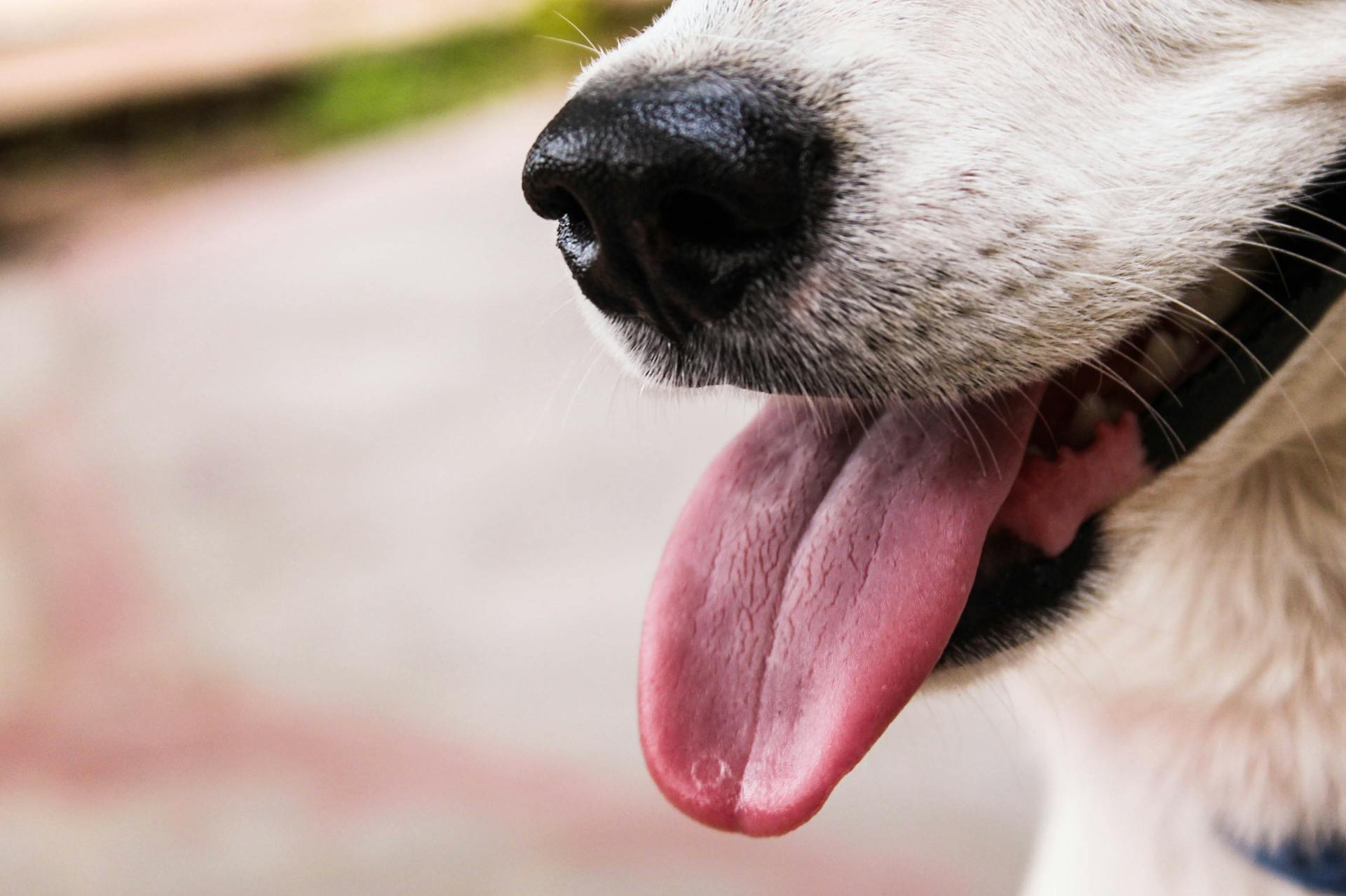
Dogs with kennel cough may also show a lack of interest in eating and appear tired. These more severe symptoms tend to occur in unvaccinated dogs, dogs with weak immune systems, or dogs with other illnesses.
If your dog has kennel cough, it's essential to keep them away from other dogs and contact your vet right away for advice.
The main symptom of kennel cough is a non-productive persistent dry cough that can sound like a goose honk or as if your pup has something stuck in their throat.
Other signs of kennel cough in dogs can include a runny nose, sneezing, lack of energy, decreased appetite, and mild fever.
Additional reading: Kennel Cough after Bordetella Treatment
Incubation
The incubation period of distemper can be quite lengthy, usually lasting between 1-2 weeks, but it can also stretch to 4-5 weeks or even longer.
Symptoms during the early incubation period, such as fever and lethargy, are often missed or overlooked.
A minimum quarantine period of one month is recommended to control an outbreak, but it's impossible to be sure of catching all cases.
ALL exposed dogs must be included in a quarantine plan to effectively control an outbreak, and even then, it's a challenging task.
Discover more: Kennel Cough Isolation Period
Treatment and Cost
Kennel cough treatment is usually straightforward, but the cost can vary depending on the severity of the symptoms and the dog's size. In general, the cost of treatment ranges from $75 to $200.
Medications like antibiotics and cough suppressants may be prescribed, which can add to the cost. Antibiotics like doxycycline or Clavamox can cost between $30 to $50 for a course of treatment.
In severe cases, hospitalization may be necessary, which can increase the cost significantly. However, pet insurance can help reduce these costs. Most dogs recover from kennel cough within a week or two, but it's essential to follow up with a veterinarian if symptoms persist.
Here's a breakdown of the estimated costs:
- Veterinary examination and medications: $75 - $200
- X-rays and lab work (if required): $200 - $500
- Cough medicine (antitussives): $30 - $50
- Hospitalization (if necessary): variable costs
Treatment
Treatment for kennel cough can be as simple as waiting it out, as most dogs will recover on their own within 10 to 14 days. However, antibiotics may be prescribed if the dog has a fever, is very lethargic, or has yellow or green discharge.
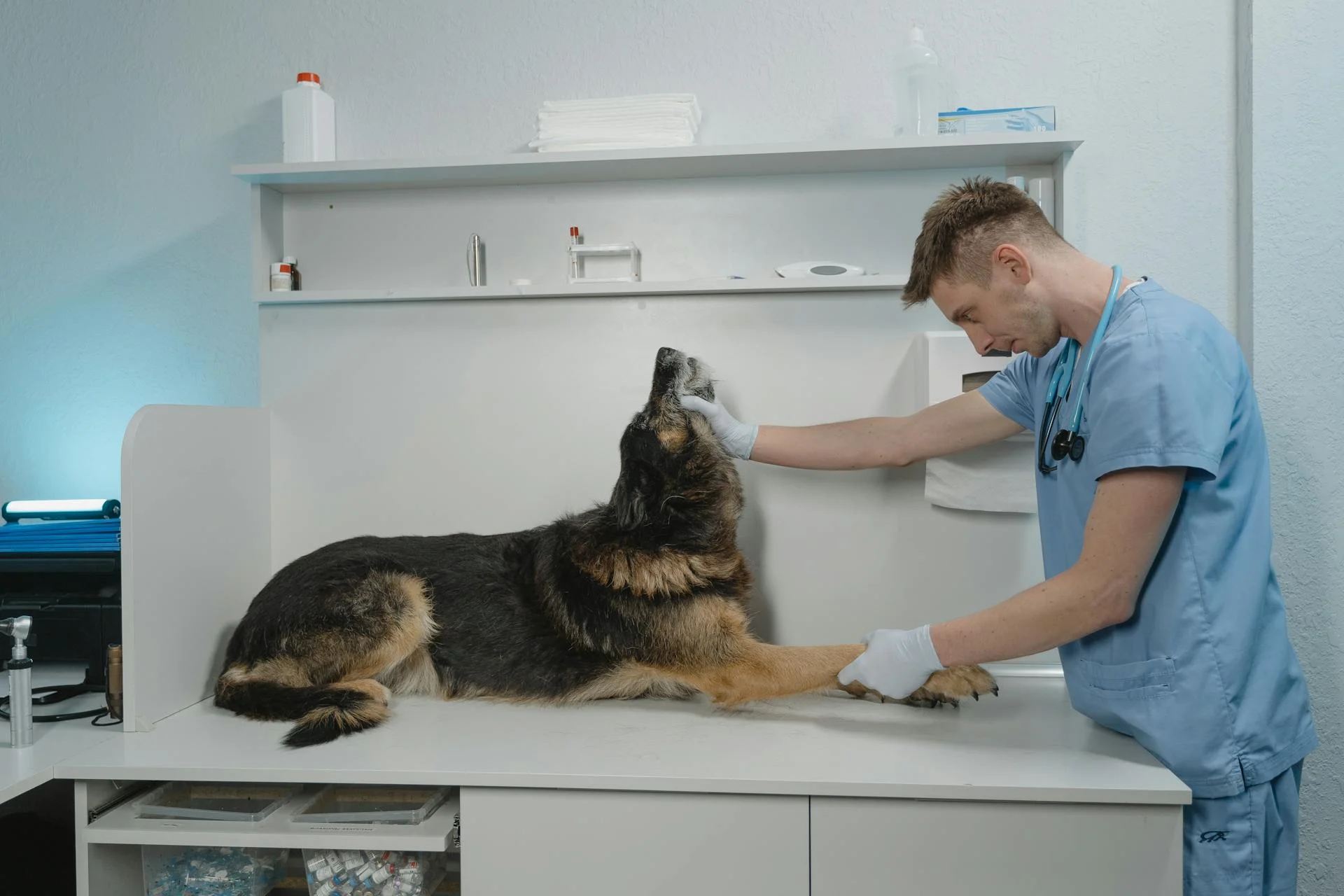
Antibiotics like doxycycline or Clavamox can help treat secondary bacterial infections, which are common in puppies and dogs with weak immune systems. Antibiotics can also shorten the shedding period, making the dog less contagious to other dogs.
A cough suppressant may be prescribed if the cough is severe, but be aware that it can make it harder for the dog to clear the infection. Coughing is a natural way for dogs to expel mucous and infectious agents.
In mild cases, a humidifier or a shower-steamed bathroom can provide relief, while a harness should be used instead of a collar to avoid irritating the throat. Canned foods and softened kibble are recommended for easy eating.
In severe cases, aerosol therapy and bronchodilators may be prescribed to expand the airways for easier breathing. Hospitalization might be required if the dog develops pneumonia, and treatments like coupage and oxygen therapy may be necessary.
Here's a summary of the treatment options:
Most dogs recover from kennel cough within a week or two, but a follow-up veterinary appointment is essential if symptoms persist.
Treatment Cost

The treatment cost for kennel cough can be a significant expense, but there are some factors to consider. The cost of treatment usually ranges from $75 to $200, depending on the dog's size and the medications needed.
If your vet recommends X-rays or lab work, you can expect to pay an extra $200 to $500, depending on the tests.
Cough medicine, also known as antitussives, can cost between $30 and $50 for a course of treatment. This is a relatively affordable option, but it's essential to follow your vet's instructions to ensure effective treatment.
If pneumonia develops or your pup needs to be hospitalized, the costs will increase substantially.
Discover more: Cost for Kennel Cough Vaccine
How Do Get?
Kennel cough is highly contagious and can spread through airborne droplets when a dog barks, transferring the bacteria to others.
Direct contact between dogs, such as touching noses or sharing toys, is another way the infection can spread.
Contaminated surfaces like water and food bowls are also hot spots for bacteria.
The disease can be easily spread in kennels, shelters, or boarding facilities where animals are in close contact with each other.
Before taking in animals, most kennels require dogs to be up to date on their vaccines, which includes vaccines to prevent kennel cough.
A unique perspective: Can Dogs Get Kennel Cough More than Once
Recovery and Prevention
Recovery from kennel cough typically takes 3-4 weeks for most dogs, but can take up to six weeks for young pups, senior pets, and immunocompromised dogs.
It's crucial to keep your dog isolated from other dogs for up to 14 weeks after the symptoms are gone to prevent re-infection.
Preventing kennel cough is easier than treating it. Annual vaccination against Bordetella bronchiseptica, parainfluenza virus, feline distemper, and other infectious agents can significantly alleviate symptoms if your dog does contract the disease.
To prevent kennel cough, follow your vet's vaccination recommendations, and choose a kennel or dog daycare facility carefully. Make sure to check online reviews, ask for a tour, and verify their health and vaccination requirements.
Here are some key vaccination requirements to consider:
Some pets may experience mild side effects after vaccination, such as sneezing, coughing, and discharge from the nose or eyes, but these side effects are usually not serious and go away within 1-3 days.
Suggestion: Kennel Cough Injection Side Effects
Recovery and Risk
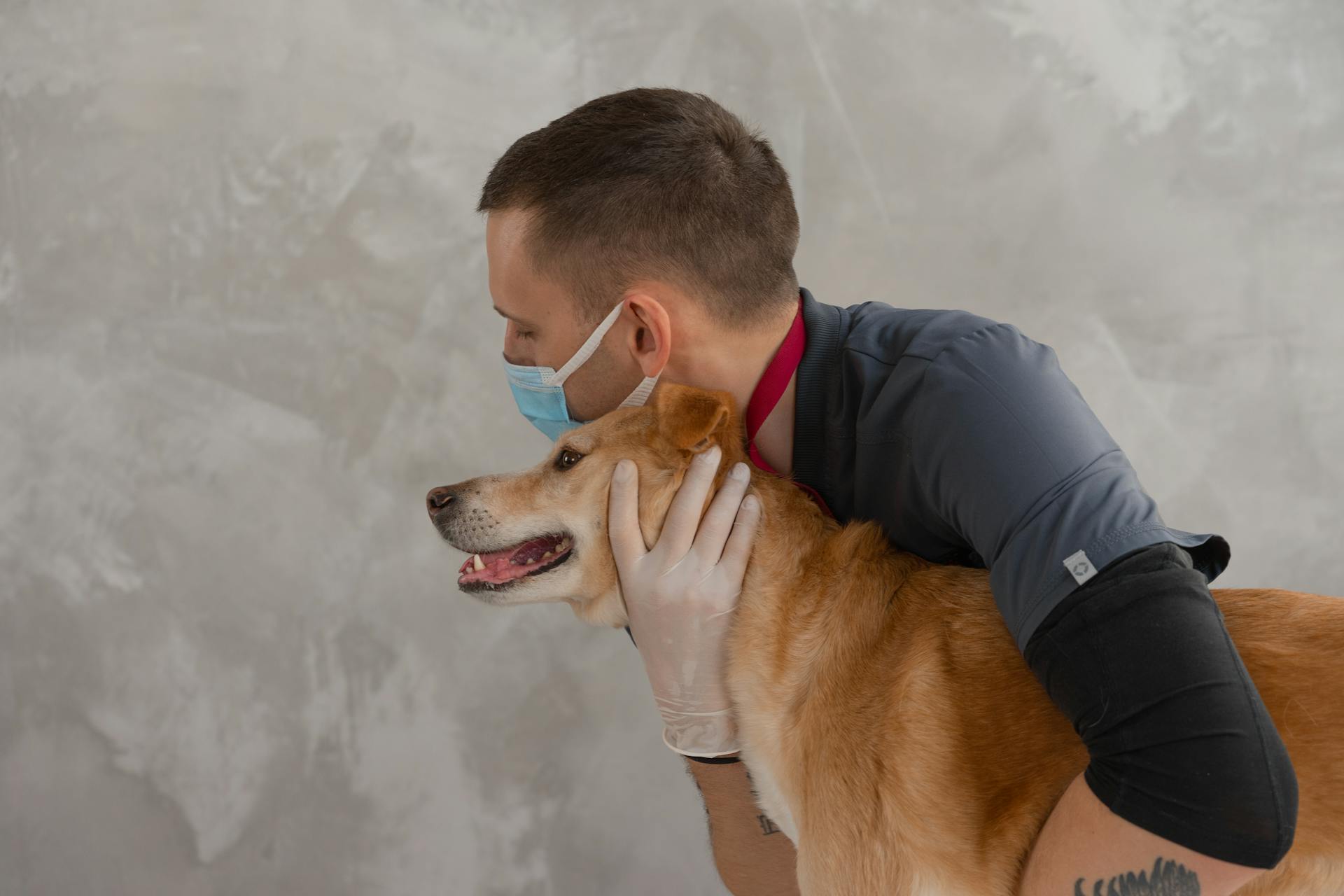
Recovery from kennel cough or distemper can take several weeks. Dogs usually recover from kennel cough within 3-4 weeks, but young pups, senior pets, and immunocompromised dogs might need up to six weeks to recover.
It's crucial to keep your dog isolated from other dogs during this time to prevent the spread of the disease. Kennel cough is contagious for up to 14 weeks after the symptoms are gone, so it's essential to minimize contact.
Recently recovered dogs can shed the virus for up to 3 months, although a shorter shedding period is more common. This means they should be kept separate from the general adoptable population until at least four weeks after resolution of clinical signs.
If isolating your dog for such prolonged periods is impractical, PCR testing can be used to assess whether they are continuing to shed detectable virus. Nasal and rectal swabs should be taken over a several day period at least 2 weeks after recovery.
Related reading: Incubation for Kennel Cough
Prevention
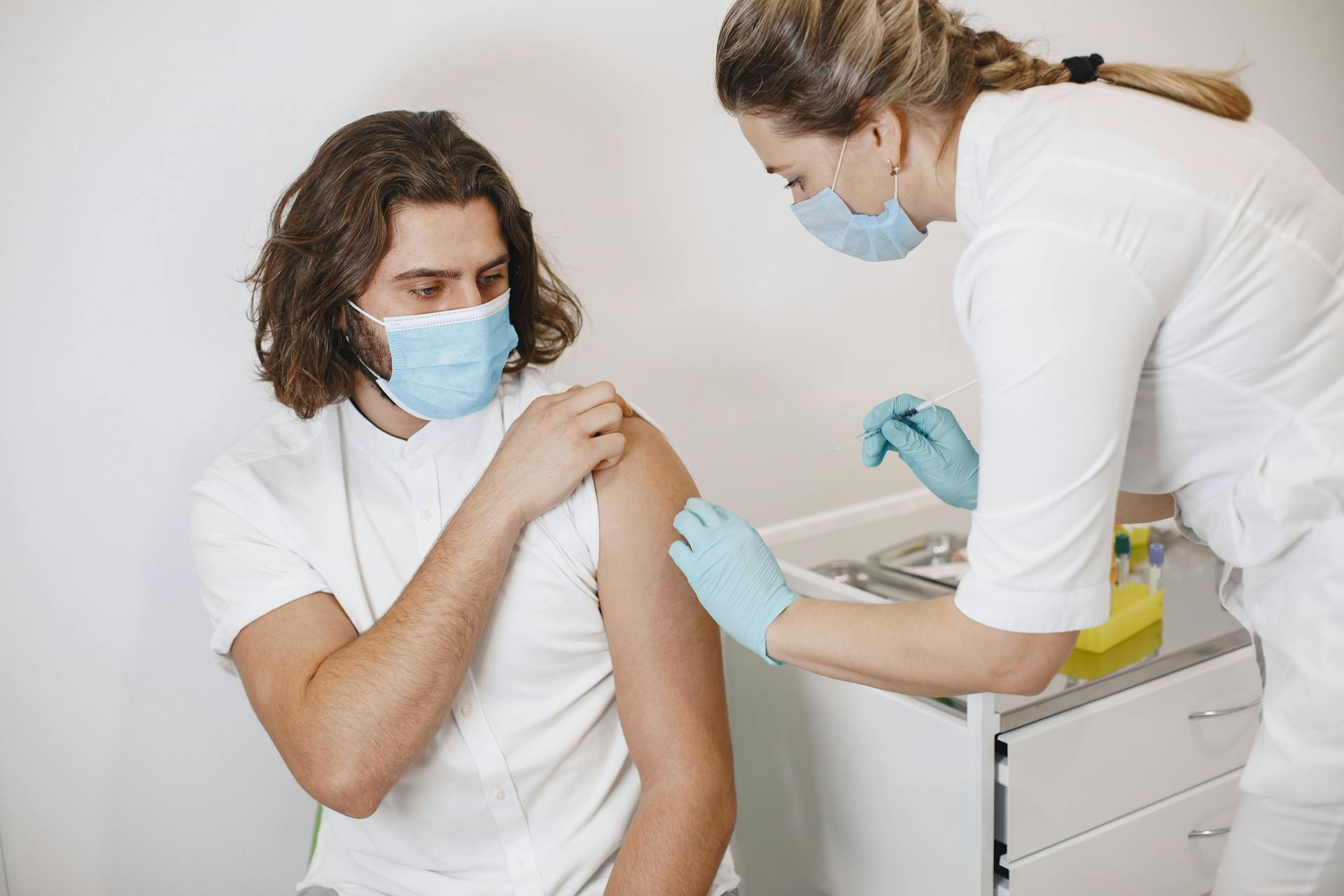
Prevention is key when it comes to kennel cough. Vaccination is highly recommended for pets that are in frequent contact with other pups.
Annual vaccination can help prevent or alleviate the symptoms in case your pup comes in contact with an infectious agent. The vaccines that help prevent kennel cough include vaccinations against Bordetella bronchiseptica, parainfluenza virus, feline distemper, distemper virus for dogs, adenovirus type 2, and influenza virus.
Some pets may experience mild side effects after having the vaccine, including sneezing, coughing, and discharge from the nose or eyes. These side effects aren't serious and usually go away after 1-3 days.
It's also essential to choose a kennel, dog boarding, or daycare facility carefully. Look for a facility that requires vaccination against kennel cough from all the pets it accepts. This would decrease the likelihood that your dog could get infected while visiting one of these places.
Here are some steps to take when selecting a kennel or daycare facility:
- Get a recommendation from someone you trust
- Check online reviews
- Ask for a tour of the facility
- Check if the facility has health and vaccination requirements for the pets it accepts
Vaccines
Vaccines are a crucial part of kennel cough prevention. Vaccination is highly recommended for pets that are in frequent contact with other pups.
You can protect your pup by following your vet's vaccination recommendations. The vaccines that help prevent kennel cough include vaccinations against Bordetella bronchiseptica, parainfluenza virus, feline distemper, distemper virus for dogs, adenovirus type 2, and influenza virus.
Annual vaccination can help prevent or alleviate the symptoms in case your pup comes in contact with an infectious agent. Vaccines don’t totally prevent infection but they will significantly alleviate your dog’s symptoms if they do contract the disease.
Some pets may experience mild side effects after having the vaccine, including sneezing, coughing, as well as discharge from the nose or eyes. These side effects aren’t serious and go away after 1-3 days.
It's recommended to allow a week after vaccination before you let your dog come in contact with other pups. This ensures the vaccine will best be able to protect your dog.
Here are the vaccines that can help prevent kennel cough:
- Bordetella bronchiseptica
- Parainfluenza virus
- Feline distemper
- Distemper virus for dogs
- Adenovirus type 2
- Influenza virus
Frequently Asked Questions
Can kennel cough be mistaken for distemper?
Yes, kennel cough can be mistaken for distemper in its early stages, as both conditions share similar symptoms such as coughing and runny nose. However, distemper is a more severe and potentially deadly disease that requires prompt veterinary attention.
Does distemper have a cough?
Yes, dogs infected with distemper can experience coughing, among other symptoms similar to a human cold. Coughing is a common symptom of distemper, but it's essential to seek veterinary care for proper diagnosis and treatment.
Sources
- https://resources.bestfriends.org/article/kennel-cough-dogs-symptoms-treatments-vaccine
- https://www.healthline.com/health/is-kennel-cough-contagious-to-humans
- https://www.dvm360.com/view/canine-distemper-proceedings-0
- https://www.pawlicy.com/blog/kennel-cough/
- https://www.lakecross.com/site/blog-huntersville-vet/2022/04/15/dog-kennel-cough
Featured Images: pexels.com


